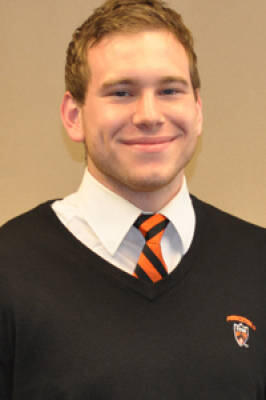Sprint Football Players Grapple with Loss of Team
On April 11, the sprint football team, along with some of its young alumni, entered a meeting with President Eisgruber ’83 to hear the fate of the program. By the meeting’s end, the team no longer existed.
“Most players were pretty shocked,” said Max Skelly ’16, an offensive and defensive lineman and one of the team’s co-captains. “We knew there was a review and we didn’t really know what the results would be, but for most of us it would never cross our mind that they would actually cut the program.”

Skelly found the decision especially surprising in light of the program’s support from alumni, something demonstrated during the 2015 Tiger Athletics Give Day.
“We placed in the top three for highest quantity of donations and for highest alumni participation rate, meaning people who actually played the sport and then chose to donate,” Skelly said, noting that the team earned $18,000 in matching funds from the Princeton Varsity Club.
The University’s official announcement about discontinuing the team cited underperformance on the field (including a streak of 106 consecutive losses) and a high injury rate.
“It feels like our interests and passions were not heeded whatsoever in this decision and the school has simply told us to give up, which is never a good feeling to have,” said Tyler Kaye ’18, a wide receiver and punter.
Kaye argued that support in the form of recruiting spots from the University would have served to lower injury rates, as the team would then “have a stronger core of guys who know the game well, and thus we would not force people into situation in which they are not prepared to play a certain position.”
Despite recognizing the disadvantages of having no recruited sprint football players, both Kaye and Skelly view that as central to the team’s identity.
“None of us are recruited athletes. We all joined the team to compete and feel a part of a brotherhood,” Kaye said. “That brotherhood will never leave.”
“We’ve always been the underdogs of the athletic department,” Skelly said. “Experiencing that, experiencing the losing streak bonds you in a unique way, going through the struggles of trying to win every season.”
Alumni of the sprint program are coordinating efforts aimed at keeping the team alive in some form, the players said. One idea is to reorganize the program as a club team with the hopes of eventually reemerging as a varsity program, similar to the trajectory of the varsity wrestling team, which was cut for financial reasons in 1993 but later reinstated.











No responses yet